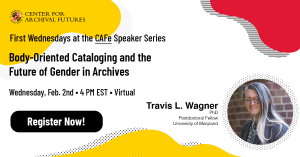Events
CAFe Speaker Series: Body-Oriented Cataloging and the Future of Gender in Archives
Event Start Date: Wednesday, February 2, 2022 - 4:00 pm
Event End Date: Wednesday, February 2, 2022 - 5:00 pm
Location: Virtual

Speaker:
Travis L. Wagner, PhD
Postdoctoral Fellow
University of Maryland
Bio:
Travis L. Wagner received their Ph.D. in Information Science from the University of South Carolina’s School of Information Science. Their primary research interests include critical information studies, queer archives, and advocacy in sociotechnical systems. Their recent publications include articles in the Journal of Information Science and the Journal of the American Medical Informatics Association. They are also the co-creator of the Queer Cola Oral History and Digital Archive.
Talk/Topic Abstract:
Archival description and cataloging continue to be the cornerstones to making information accessible within cultural heritage institutions. While there exist nuanced and context-specific standards, many of these approaches fail to accurately represent the complexity of human identity. In some cases, this failure is due to shifts in terminology away from outdated and offensive concepts. In other cases, it is because identities remain in flux, and naming that identity often fixes it within a state of being that simultaneously ignores historical contexts while avoiding how access to that identity might shift in the future. Though such a challenge holds true for almost any socially constructed identity, the problem proves particularly challenging regarding gender identity. The continued rise in transgender and gender non-binary identities has challenged information professionals to make better their commitments to equitable access and inclusion while also understanding that naming identity can be a messy practice. Archives hold a special place in this conversation as they often house materials rich in gender-diverse potential yet are hesitant to name those identities for the sake of divisive responses. This talk aims to navigate these challenges by reflecting on catalogers who attempt to make sense of naming gender as a socially constructed identity. Pulling from a combination of qualitative research, existing archival description practices, and rich archival documents (focusing on visual materials), the presentation avoids providing attendees with any best practices. Instead, the presentation argues that gender description in archives lays bare the inherent subjectivity of information professionals. In doing so, I will argue that archival collections can become a far more collaborative space by leaning into this subjectivity. As a result, those working in archives can play an active role in forming the ever-growing history of queer embodiment.